
VOL. I NO. 7 DELHI, THURSDAY OCTOBER 29, 1942
HONG KONG, CANTON, LINSI
Enemy's Heavy Industry Now Sorely Periled
United States Army bombers left a thundering message for Hirohito last week when China Air Task Force planes drove deep into Japan's industrial heart in North China, bombed Hong Kong twice and hit Canton.
In the first Hong Kong raid, during which the Jap modestly reported that the Americans dropped a few incendiary bombs, 20 tons of bombs bracketed docks and shipping in the Kowloon area. After the bombing the American flight was engaged by a large formation of enemy fighters of which 13 were destroyed and nine probably destroyed. One American bomber failed to return.
In addition, six American fighters recently intercepted 20 Jap fighters south of Mengtze in Southern Yunan, destroying four more and returning without loss to themselves.
In the second Hong Kong raid, the North Point power station was the objective. All bombs were reported to have landed in the target area and the power plant was destroyed.
Later in the morning the White Cloud airdrome, northeast of Canton, was attacked by American bombers with many fires observed as the result. Jap fighters intercepted the flight but all bombers returned from both the canton and the second Hong Kong raids.
The North Point power station supplies all of Hong Kong's needs. It was the first building attacked by the Japs when they landed last December, bu they did not destroy the machinery. They did, however, cut off the current until the colony surrendered.
According to a communique from General Stilwell's Chungking headquarters, the planes attacked the Linsi mines which are believed to supply more than 50 percent of the coking coal used in the production of high grade steel in Japan. In addition the mines supply all the coking coal used in the great Japanese industrial concentrations in Manchukuo.
SIGNIFICANT RAID
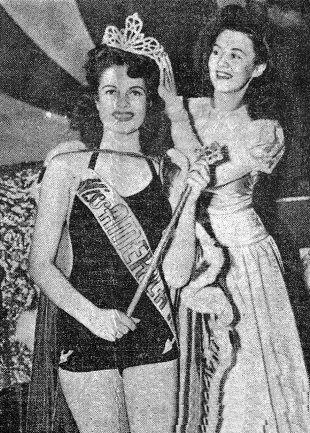 SHE CAN SING, TOO - Even in wartime, that lucky little group of fellows got together in Atlantic City last month, looked over America's lovliest gals, and chose Jo Carroll Dennison, a flashing-eyed beauty from Tyler, Texas, as Miss America 1942. The judges said they also like Jo's rendition of "Deep in the Heart of Texas." Frances Burke, Miss America 1940, does the crowning.
SHE CAN SING, TOO - Even in wartime, that lucky little group of fellows got together in Atlantic City last month, looked over America's lovliest gals, and chose Jo Carroll Dennison, a flashing-eyed beauty from Tyler, Texas, as Miss America 1942. The judges said they also like Jo's rendition of "Deep in the Heart of Texas." Frances Burke, Miss America 1940, does the crowning.
|
During what was unofficially called the most significant air action of the war in this theater, many direct hits were observed on the target area, according to the communique, and all American planes returned safely to their bases.
The mines, which are run by the Kallan Mining Administration, furnish all the coking coal for the Mukden Arsenal, airplane factories and other Manchukuo heavy industries.
According to information obtained from various reliable sources, the mines are extremely vulnerable. They are "wet" mines in which pumps must be manned at all times or they will be flooded. The maintenance of these pumps depends on the powerhouse which may or may not have been hit. There was no official announcement. Once several years ago, however, there was a two-hour power failure in the mines which caused a flood that kept them out of production for three months.
Armchair strategists throughout the theater immediately went to work, following the announcement of the raid, and it wasn't hard to determine that if American bombers can reach an objective almost as far north as Vladivostok that no port on the Yellow Sea (Shanghai for instance) is safe and that Manchukuo's industrial empire may one day follow in the calamitous footsteps of Cologne, Bremen and Coventry.
SURPRISED
The area was apparently taken completely by surprise. Aircraft were able to take two careful and uninterrupted runs at the target before opposition developed. Then it was only weak and ineffective fire from one anti-aircraft battery.
It was considered significant that the Tokyo stock market took a beating the following day with Shinto tumbling four yen and Industrials and shipbuilding shares following suit.
The day following there was another market drop, according to information received by the Roundup, that involved all important stocks and approached panic.
Should the mines be seriously damaged by direct hits or placed out of production on a semi-permanent basis by the destruction of the powerhouse it would mean almost certain closing down of the Manchukuo heavy industries as soon as present coal reserves had been depleted. In order to forestall such a contingency, the Jap air force will be forced to divert planes from other theaters, already feeling the pinch of heavy losses in former campaigns.
N.E. ASSAM AIRPORT DAMAGED
Japs heralded the ending of the Indian monsoon season Sunday by hitting American airports in Northeast Assam with heavy bomber and fighter formations.
On the following day many enemy fighter planes escorting reconnaissance aircraft attacked and strafed the same fields, according to an official communique issued by Brig. Gen. Clayton Bissell, commanding the 10th U.S. Air Force.
Damage from the two raids was heavy. According to the communique, "the enemy succeeded is destroying and damaging several transport aircraft and some fighter planes, most of which had been grounded for routine repairs."
American fighter planes engaged the enemy on the first raid and succeeded in shooting down at least two Japs while we lost one fighter. Lt. Edward M. Nollmeyer, during the second raid, single-handedly attacked the enemy planes operating over the field, shooting one down with no damage to either himself or his plane.
Casualties were reported as one American Air Force officer killed, on British subject killed and five Americans injured, one seriously. On the morning of Ocober 26 an enemy reconnaissance plane in northeast Assam was shot down in flames.
THEATRE'S FIRST ACE IS CAPTAIN BAUMLER
To Captain Albert John "Ajax" Baumler, 28-year-old Bayonne, New Jersey-born Adjutant and Flight Leader of a China Air Task Force pursuit squadron, goes the distinction of becoming this theater's first air ace.
Latest reports credit Baumler with having shot down five Japanese planes - two bombers and three fighters - in combat over China.
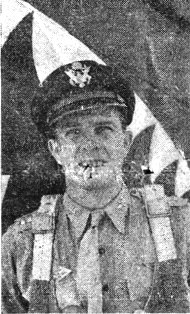
|
Baumler's most notable feat took place last July when he and Major John F. Allison each shot down two Jap bombers over hengyang in the first night combat by American planes in China.
The Captain broke into actual combat flying during the Spanish Civil War. Arriving in Spain in December, 1936, after graduation from Kelly Field the previous June, he was given the honorary rank of Teniente (First Lieutenant) in the Air Force of the Spanish Republic. Baumler actually remained a civilian since he was not required to take an oath of allegiance to Spain. Before returning to the United States in the fall of 1937, Baumler had seen combat on the major fronts and was credited with destroying four Italian planes and three German aircraft.
GAVE TESTIMONY
In the spring of 1938, Baumler was called before the House Military Affairs Committee to testify on the efficiency of Axis aerial support in the Guadalajara offensive.
In the fall of 1938, he was placed on active duty at Kelly Field, Texas, where he served as an instructor in pursuit flying until October, 1940. From Kelly Field he was transferred to Barksdale Field, Louisiana and later to Selma, Alabama.
AVG VETERAN
Baumler joined General Claire L. Chennault's American Volunteer Group in June, 1941, as a Squadron Leader. Until November, 1941, he was occupied in securing pilots for the AVG.
The Captain left Wake Island on a Hong Kong-bound clipper on last December 7, when news came of the attack on Peral Harbor. The clipper returned to Wake where Baumler offered his services to Major Devereaux, Marine Commander.
A few days later, Baumler re-entered the Army Air Corps and remained on duty in Hawaii until February 23, 1942, when he returned to Washington and was assigned to supervise a flight of fifty airplanes from Africa to China. On April 22, Captain Baumler joined General Chennault as the first Army officer assigned for combat duty with the AVG.
JAPS THREATEN CAPTURED YANK FLIERS WITH DEATH
Something new in military jurisprudence flashed across the horizon last week when the Japanese announced that crews of enemy fliers captured after bombing Japan or Japanese-occupied territory would be tried before military courts and be condemned to death if found guilty of inhuman acts.
The Tokyo radio announced that "U.S. prisoners who took part in the indiscriminate raid bombing of Tokyo and other towns on April 18, were severely punished in accordance with Japanese military discipline."
INHUMAN ACT
The radio announcement continued as follows: "It will be recalled that U.S. aircraft raided, among other towns, Tokyo, and deliberately bombed schools and hospitals in the suburb of the city where there were no military objectives. The Chief of the Board of Information said as the enemy committed an inhuman act he should be drastically punished even after he had been taken as a prisoner of war, while in other cases he would be treated as an ordinary prisoner of war."
In a broadcast in Chinese from Tokyo, the following statement was made: "When U.S. air force made an air raid on Japan a primary school was destroyed and innumberable innocent people were killed. An American pilot was
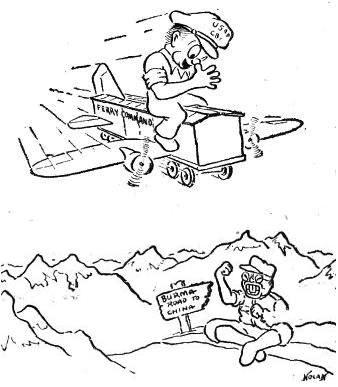
|
"The C-in-C of the Defense Forces of Japan has announced that hereafter any similar attempt to disturb the public safety of Japan, Manchukuo and any Japanese-occupied place will be treated under the most serious measures of the martial law of Japan."
STIMSON SAYS -
Secretary of War Stimson said that it was possible that some of the Tokyo fliers had been forced down after leaving Japan and had been captured. He said that the War Department had no information on them other than that picked up in Jap radio braodcasts that the men had been tried.
The Secretary stressed the fact that America is treating Jap war prisoners as internees strictly according to international law and the Geneva Convention. He said he hoped the reports of ill treatment of American prisoners were untrue and he refused to comment when asked if the United States would reciprocate if the reports were found to be true.
American pilots in Australia, meanwhile, roared with laughter at furious Jap reprisal threats issuing from the Tokyo radio following Flying Fortress raids on Rabaul. The Jap said, among other things, that such "butchery will not go unpunished.
SGT. EARNS PURPLE HEART
On the night of July 30, 1942, 1st. Sgt. Thomas Lee Irwin, of a China fighter squadron, assisted the airdrome officer in placing boundary lights about the field which his squadron was operating from on the eastern front while enemy bombers roared overhead dropping their bombs on the field.
Sgt. Irwin remained on duty and directed two damaged fighters to a safe landing. This extraordinary meritorious service, in the face of an attack on the airdrome, "reflects great credit upon the service and serves as an inspiration to the others of his Command. For his disregard of personal safety to direct two badly needed airplanes to a safe landing. Sergeant Irwin has been awarded the Purple Heart," the citation read.
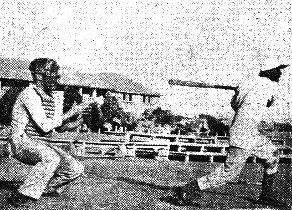 TIGHT GAME - They're still playing plenty of ball at our outlying stations as witness this shot taken at an Indian
port station. Corp. David Boyd is shown knocking out a long single in a game between the QM Port Bn. and a Truck Co.
The "Porters" won 1-0, with Boyd being the winning chucker.
TIGHT GAME - They're still playing plenty of ball at our outlying stations as witness this shot taken at an Indian
port station. Corp. David Boyd is shown knocking out a long single in a game between the QM Port Bn. and a Truck Co.
The "Porters" won 1-0, with Boyd being the winning chucker.
|
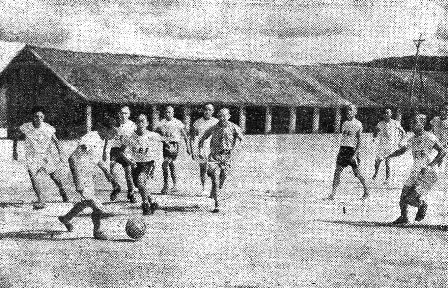 FAVORITE SPORT of the Chinese Expeditionary Force stationed at the Chinese-American training center here in India
is soccer. You can see a soccer game in progress almost any day of the week.
FAVORITE SPORT of the Chinese Expeditionary Force stationed at the Chinese-American training center here in India
is soccer. You can see a soccer game in progress almost any day of the week.
|
FORMER A.V.G. PILOT GETS SILVER STAR
Upon recommendation of the group commander, the China Air Task Force, awarded Major Frank Schiel, Jr., former A.V.G. squadron leader the Silver Star for his gallant execution of a highly dangerous photographic mission over Hanoi, Indo-China on September 13, 1942.
major Schiel took off from this station in an interceptor, flew over the enemy airdrome, over 170 miles within the Japanese lines and began to make photo runs at the field. Japanese fighters took-off to intercept the lone ship and began to climb toward the squadron leader.
Major Schiel completed his mission and turned for home with the Japs only a short distance away. Through Major Schiel's action, pictures were obtained that made it possible to stage one of the most effective raids in this theatre of operations.
ACE PRAISES GROUND CREWS
New York City - Former "Flying Tiger" Robert Hedman, twice decorated by Chiang Kai-Shek for shooting down four bombers and a fighter, vacationing here before returning to active service, paid a tribute today to the tiny ground crews which serviced the "Tigers" planes.
"Sure we took planes up and fought them," Hedman declared, "but those mechanics and armorers are the ones who pulled the miracles. They had only a few spare parts and supplies, not enough men for their work and their working conditions were far from good, but they patched, repaired and kept our planes ready for combat even under enemy bombing and strafing attacks."
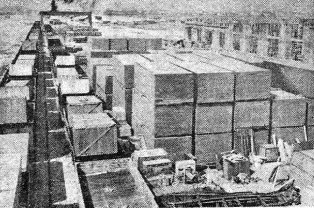 CRATED CARS - Huge crates containing trucks and other vehicles are hauled and unloaded from flat-cars at a U.S.
Army assembly point after arrival at an Indian port. At right is a section of the new warehouses being built for
supplies.
CRATED CARS - Huge crates containing trucks and other vehicles are hauled and unloaded from flat-cars at a U.S.
Army assembly point after arrival at an Indian port. At right is a section of the new warehouses being built for
supplies.
|
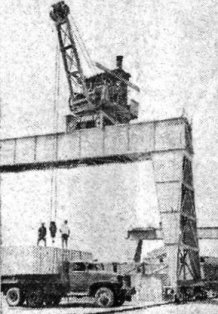 GOING DOWN - A moving crane and a newly assembled truck are used to move the crates from the congested unloading
dumps to other assembly spots.
GOING DOWN - A moving crane and a newly assembled truck are used to move the crates from the congested unloading
dumps to other assembly spots.
|
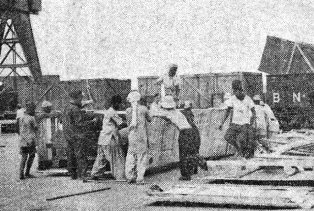 UNCRATING - Indians assist U.S. soldiers in uncrating as loaded flat-cars with other trucks move by for orderly
disposal. The soldiers are assembly experts who keep the new vehicles rolling out.
UNCRATING - Indians assist U.S. soldiers in uncrating as loaded flat-cars with other trucks move by for orderly
disposal. The soldiers are assembly experts who keep the new vehicles rolling out.
|
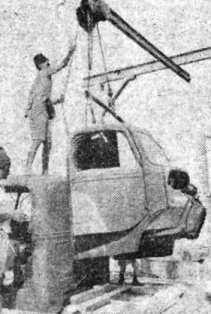 PIECE WORK - A truck cab is swung onto a truck as the parts move swiftly and systematically along the assembly line.
PIECE WORK - A truck cab is swung onto a truck as the parts move swiftly and systematically along the assembly line.
|
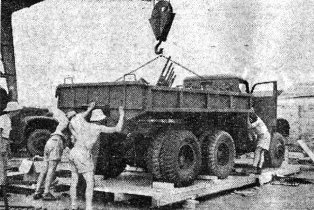 FINAL CHECK - This heavy duty truck gets a final, thorough check as it reaches the end of the assembly line.
It's designed for rough going.
FINAL CHECK - This heavy duty truck gets a final, thorough check as it reaches the end of the assembly line.
It's designed for rough going.
|
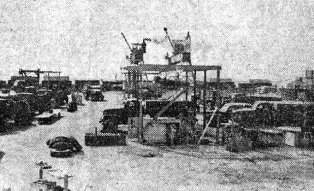 MOVING OUT - Newly-assembled vehicles are ready to roll away as the overhead cranes swing a seemingly endless line
of crates onto the assembly ground.
MOVING OUT - Newly-assembled vehicles are ready to roll away as the overhead cranes swing a seemingly endless line
of crates onto the assembly ground.
|
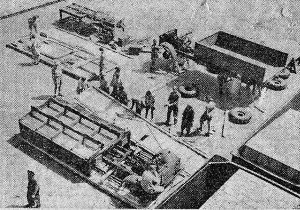 TAKING SHAPE - From a completely knocked down chassis, each truck is serviced part by part. The Indians, who have
become highly proficient in their assembly duties, work smoothly with U.S. Army personnel.
TAKING SHAPE - From a completely knocked down chassis, each truck is serviced part by part. The Indians, who have
become highly proficient in their assembly duties, work smoothly with U.S. Army personnel.
|
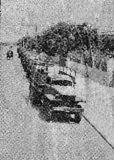 READY - Assembled trucks are lined up awaiting disposition. A few hours before they were just so many neatly
assorted parts.
READY - Assembled trucks are lined up awaiting disposition. A few hours before they were just so many neatly
assorted parts.
|
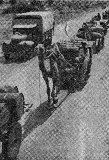 OLD AND NEW - One of the new trucks rolls by camel-drawn carts laden with drums of oil and gas for new machines
rolling off the assembly line.
OLD AND NEW - One of the new trucks rolls by camel-drawn carts laden with drums of oil and gas for new machines
rolling off the assembly line.
|
 BIRD'S-EYE VIEW - Here is how the assembly grounds looks from atop the girder of an overhead crane.
BIRD'S-EYE VIEW - Here is how the assembly grounds looks from atop the girder of an overhead crane.
|
JAP SPY CAUGHT
A few days ago T/Sgt. Jacob Lonteen and Sgt. Henry Tallmadge of a China fighter group saw a suspicious stranger loitering about the Operations Office.
They concluded that the stranger was a Jap spy and they brought the matter to the attention of some officers who failed to agree with them. They noted that the stranger was able to make his way to the control tower and with little difficulty.
As he started down the road the sergeants decided they would act on their own. The stranger was taken into custody by them and questioned by the officers. Sergeant Tallmadge was ordered to escort him to Chinese Headquarters and turn him over to them for investigation. The stranger was investigated, subsequently tried and shot as a Japanese spy, his connections having been definitely proven.
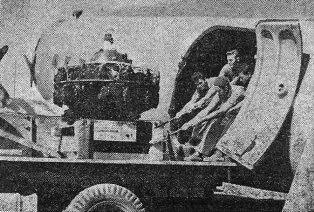 SPECIAL DELIVERY - Engines like this, seen being loaded on a plane to be flown to a repair depot, are included
in cargoes being hauled by the Air Service Command in this theater.
SPECIAL DELIVERY - Engines like this, seen being loaded on a plane to be flown to a repair depot, are included
in cargoes being hauled by the Air Service Command in this theater.
|
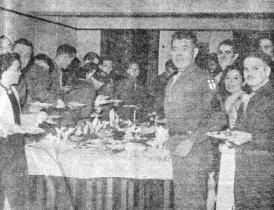 CELEBRATION - Members of the Headquarters Detachment attend a Double Tenth celebration given by friends on the
anniversary of the founding of the Chinese Republic.
CELEBRATION - Members of the Headquarters Detachment attend a Double Tenth celebration given by friends on the
anniversary of the founding of the Chinese Republic.
|
Chinese Wine and Dine U.S. Aviator Forced Down In P-40
The Chinese came out of the fields and had me quickly surrounded, but I produced my identification flag and from then on was their bosom buddy. There was a small village nearby and eventually I was conducted to the headman who took me in tow and led me to his home. A council of all the big-wigs in the neighborhood was called to look me over.
Choice things to eat were brought out such as tins of pineapple, candy and cakes - things that are like gold to them and that they treasure even more thanwe do 30-year-old whiskey. A feast was held and from then on nothing was too good for me. After getting entirely too much to eat, the best bed in the house, of good pine boards, was prepared for me. I was treated like a king (I later discovered that this was the first time any of them had seen an airplane on the ground) with separate basins for washing my hands and feet.
QUESTION BOMBARDMENT
In about three hours a Captain of the Chinese Army arrived. He spoke English after a fashion and was operating with the intelligence department. I immediately began to bombard him with questions, hoping to learn much of the Japanese installations in that area. After learning all I could, I retired amid the discussion of my flight by those who had been invited to the feast.
The next morning about nine o'clock three small animals the Chinese called horses were led up for my trip to Paoshan. Before leaving I visited my plane and took everything that could be detached, and arranged for an army guard. The trip up the trail was then begun at the rate of about one mile per hour.
The news of the plane had travelled fast and each village we came to had turned out en-masse - a holiday having been declared in the whole section. At each village we had to stop as a banquet had been prepared - complete with rice wine. After two or three stops I had difficulty staying on the horse.
MORE SPEED
Arriving at Niowang, the mayor gave me one of his private horses and I found this one somewhat better with a cruising speed of about 1½ m.p.h. - the others found it difficult to keep up.
A call to Chinese Army Headquarters in this area was put through here and it was arranged to have a car meet us as far down the road as they could come. The trail was followed until we hit the Burma Road. Here I found it necessary to continue on the horse for five more miles as in places the road had been blown up by the Chinese. As darkness drew on we met the car and the soldiers took over the horses and started back. My conscience was relieved at this time as I felt sorry for the soldier who had walked all day carrying my parachute. He was dead tired.
With three staff officers and the postmaster we proceeded the remaining distance to Paoshan in style. Here I met the Commanding General of the Chinese Army in that area and his Chief of Staff. I spent the night in the Generals quarters.
ANOTHER BANQUET
The next day, September 24th, was being celebrated throughout China as the mid-autumn festival. This corresponds somewhat to our own Thanksgiving. The entire army staff threw a banquet in my honor andagain one of the features was the rice wine. The feast began at ten o'clock in the morning and lasted until noon. I have never seen so much to eat. There were over twenty courses, including partially cooked chicken, fish complete with heads and tails, and many other delicacies of undistinguishable constituency.
I ate and drank until I bacame slightly ill. After recuperating somewhat I went over to the hospital to see some American Officers who were confined there and found they were in care of competent hands. Here I met a Chinese, Dr. May, a truly brilliant man, who was at one time head of his class at Johns Hopkins University. He, the nurses and four British soldiers threw a party that night celebrating the festival.
The menu consisted of moon cakes (circular dough cakes with sugar centers) and various nuts and candy. Everyone joined in and sang songs to the accompaniment of Dr. May and his musical saw. I spent the night in the hospital.
The next day a truck was to start toward my home airdrome and four Britishers, a Chinese radio operator, oil drums, engines, and myself made up the cargo. The truck was a charcoal burner and I found that getting the fire going was quite a ritual - we ran shifts cranking the blower for about twenty and finally succeeded in getting it started. Everybosy gathered around to bid good-bye and it reminded me of a boat sailing.
NO BRAKES
We rumbled along for awhile, packed in like sardines, when suddenly in the middle of one of the downhill
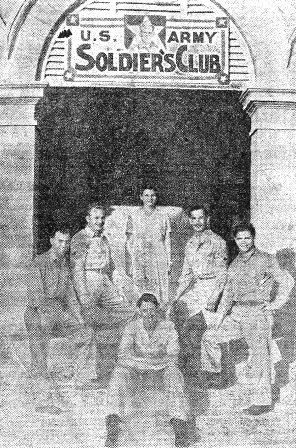 SOLDIER CLUB MEMBERS - These fellows belong to one of the two soldiers' clubs that we know about in this theater.
The club is located at an Indian port base. Seen with the young lady, Miss B. Lynch, are: Pfc. Jack Stansang,
S/Sgt. R. L. Stansang, Pvt. Joe Heinrich, M/Sgt. Ed Zeman, Sgt. K. C. Kliner.
SOLDIER CLUB MEMBERS - These fellows belong to one of the two soldiers' clubs that we know about in this theater.
The club is located at an Indian port base. Seen with the young lady, Miss B. Lynch, are: Pfc. Jack Stansang,
S/Sgt. R. L. Stansang, Pvt. Joe Heinrich, M/Sgt. Ed Zeman, Sgt. K. C. Kliner.
|
Arriving at Yungping about eleven o'clock at night we slept on the floor of the truck. When we awoke the next morning the Chinese radio operator complained of a wounded finger and one glance was enough to tell that blood poisoning had set in, so I immediately located a sharp knife, lanced it, and soaked it in hot salt water.
We then proceeded on to Tali arriving about five in the afternoon at the home of Mr. Snow, a missionary and head of the China-India Mission sponsored by Great Britain. A doctor lanced the injured hand again and pronounced it under control. After Mrs. Snow had served us a delicious supper we were again privileged to sleep under a blanket and on a good rope bed.
CHINESE FOOTBALL
On our way out of tali one of the British stopped to take a picture of the mountain in the background. Just as he was about to snap the picture a Chinese tackled him as though he were playing football, knocking him to the ground. It seems there is a graveyard on the slope behind the town; in fact it is the biggest graveyard I have ever seen, being about the aize of two golf courses and containing some million graves. It seemed that the Chinese objected to a picture being taken of the graveyard as they believed it would drive the good devils away.
Our radio operator acted as interpreter and explained that the picture was of the mountain and that he had no idea that the man's father was buried in that metropolis of tombstones. The Chinese bowed, smiled, gestured and apologized, and called the Chinese something quite uncomplimentary in English, and every one gained considerable face in general.
After three days we reached an airfield where I could be picked up by one of our planes. All this time to retrace a space that I had covered in twenty-five minutes in my P-40.
After being here only a few minutes a plane arrived and picked me up. I arrived back at my station exactly a week after the escapade started - none the worse for wear thanks to the good care of the Chinese, and the best part of the journey was the warm welcome I received by all my friends when I returned.
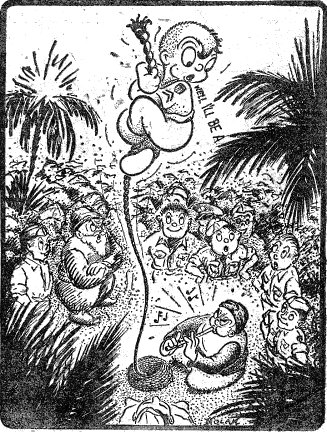
|

By LT. LUTHER DAVIS |
This week, we're the headlines.
On Sunday afternoon, October twenty-fifth, a havy formation of enemy bombers and fighters struck at our airfields in Assam, causing some damage. Our boys, as usual, made a magnificent showing, accounting for several of the enemy, and there's every reason for believing, now that the hat's in the ring, that they'll make even better showing on subsequent raids - and that the enemy isn't going to have much in the way of leisure at his airfields.
Twenty enemy fighters heading into Yunnan were met by six of our fighters. Score: 3 Japs down, 4 more probably. U.S.: nil losses.
MERRY DESTRUCTION
At the same time the Nip was making this fruitless and long expected attack, our bombers were merrily destroying the docks at Hong Kong, and on the way back, shooting down 13 enemy planes plus nine more probably. That against our loss of two planes.
Next morning they were at it again over Assam, but we were at it too - over Hong Kong for the second time in two days, and also over White Cloud Airport at Canton. That's where the Jap air force lives, and of course they came at us with every interceptor they could get their hands on. They huffed and they puffed - and shot down no American planes.
After five months of serial inactivity in Burma, the Japs have opened up.
Our raid on Linsi, which is east of Peiping and north of Tientsin, on October 21: if you can find a scrap of map and look at it you'll see that Linsi is less than five hundred miles from the nearest of the Japanese home islands.
HEAVY WAR INDUSTRY
It's in the very heart of one of the most heavily industrialized areas in the far East - the center of the enemy's war industry.
And Linsi is something even more. Concentrated around it are the few mines which are Japan's major sources of coal of sufficiently high quality to make coking coal. General Science should have taught you that coking coal is essential for the manufacture of high-grade steel.
Well now, it just happens that those mines are all of the so-called "wet" type. That is, pumps are busy twenty-four hours a day (particularly at this season) just keeping the mines from flooding.
All those pumps work by electricity - and almost all the electricity for running them is produced by a power plant at Linsi.
Neat, isn't it?
40,000 TONS LOST
Back a couple of years ago the power plant at Linsi failed for only an hour or two - the result was that the bottom two levels of the most important mine of the group were flooded for three, count 'em, three whole months. During that time something around 40,000 tons of coal were lost.
So, just for fun, imagine that the power station was blown up by our bombers on the twenty-first. Cogitate on that.
What dmage we did hasn't been announced yet. All the communique said was that the raid was "most successful" and that there were hits on the target area.
But you see the point. Even if we hadn't hit a thing, it would still be as black a day for the Japs as that April morning when the Doolittle mission appeared over Tokyo.
It means precisely the same thing. It means that they're not safe in the one place where they must, at all costs, be safe.
MORE FIGHTERS
If you look at that map again and then read the line in the communique saying that all our planes returned safely, you'll see that the Nips are going to have to do a lot of moving around of fighter planes.
The problem for the Nips is really something. Should they protect Linsi from another raid? Or maybe Shanghai? But then the so-called "bomb Tokyo" airfields are in Allied hands again - maybe they'd better send their fighters home. But then Hong Kong and Canton might get it again -
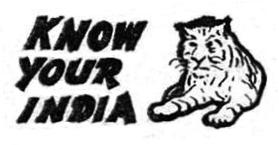
|
In the elections of 1937, which were the last held in India, the Indian National Congress Party won in seven of the eleven provinces. This party is the largest political party in the land and the greatest single force in Indian politics. It has been campaigning for the establishment of India as a completely independent country. One of its most influencial leaders is Mahatma Mohandas K. Gandhi. He is not an easy person for us to understand, but he understands India and many Indians understand and revere him. The title "Mahatma" applied to him means "great soul" and implies that its bearer has something of the qualities of a saint. And in truth, Gandhi is a religious as well as political figure. His policies and decisions are largely based on the teachings of the sacred scriptures of the Hindus. He himself prefers to be called Gandhiji, which is a respectful form about like our term Mr. Gandhi. Several years ago he retired from active leadership, but has remained the guiding spirit of the Indian nationalists.
Pandit Jawaharlal Nehru ("Pandit" is an honorary title meaning learned.), second only to Gandhi in the respect of the Congress, is a very different person. He is a leader and statesman of the kind we are familiar with, whose ideas are based on modern science and social studies. The president of the Congress in recent years has been Maulana Abul Kalam Azad, a Moslem.
Although there are a good many Moslems in the Congress party, the chief political opponent of the Congress is the Moslem League, headed by Mr. Mohammed Ali Jinnah. The Moslems are a minority in the country and the Moslem League aims to protect their minority rights.
A good many Indians understand English, so you will probably never be very far from someone who can make out what you say. The language most widely spoken is Hindustani. It is the native language of many millions
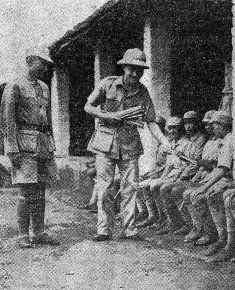 MAESTRO - Captain Carl G. Arnold, morale officer for the Chinese-American Training Camp, hands out drum sticks to
members of his newly-formed drum and bugle corps. Arnold is also editor and publisher of the camp's terrific "Bull
Sheet."
MAESTRO - Captain Carl G. Arnold, morale officer for the Chinese-American Training Camp, hands out drum sticks to
members of his newly-formed drum and bugle corps. Arnold is also editor and publisher of the camp's terrific "Bull
Sheet."
|
The most important rule to know in getting along with the people is to remember that their manners are not like ours. If you are good-natured in your dealings with Indians and realize that they have different customs than those we have learned, you won't have any trouble in your contacts with them. For example, they feel that it is only polite to tell you what they think you want to hear. So if you ask, "Is this the right road?" chances are that the answer will be "yes," even though it may by just the wrong road. But if you ask, "Which road goes through to our camp?" you'll have a much better chance of getting the right answer.
You know enough about caste to realize how important it is to stay away from Hindus while they are eating. The condition of the streets may lead you to believe that Indians are not very clean, but the homes of many Indians, especially of the upper castes, are very clean. So clean indeed, that your presence or touch may make food unfit to eat.
Indians are great family men. According to our ideas they carry this virtue to extremes. Girls are married at a very young age, when they are little more than children, so that they may raise large families. A married woman wears a red spot in the center of the forehead, both as a sort of beauty mark and as a sign that she is not a widow. Hindu women must always remain true to their husbands. In the higher castes widows may not remarry.
Indian women keep to their homes as much as possible. In fact, some of them keep purdah, which means that they never show their faces before strangers and wear veils when out of doors. Don't make a pass at an Indian woman or there may be trouble, and anyway you won't get anywhere. The prostitutes live in a special quarter of the town and do not walk the streets.
The C.B.I. Roundup is a weekly newspaper published by and for the men of the United States Army Forces in China, Burma, and India, from news and pictures supplied by staff members, soldier correspondents, Office of War Information and other sources. The Roundup is published Thursday of each week and is printed by The Statesman in New Delhi, India. Editorial matter should be sent directly to Capt. Fred Eldridge, Branch Office Hq., U.S.A.F.C.B.I., New Delhi, and should arrive not later than Monday in order to make that week's issue. Pictures must arrive by Sunday and must be negatives or enlargements. Stories should contain full name and organization of sender.

OCTOBER 29, 1942
Original issue from the collection of C.B.I. Roundup Correpondent Al Sager, shared by CBI veteran Dave Dale.
Copyright © 2006 Carl Warren Weidenburner. All rights reserved.
TOP OF PAGE PRINT THIS PAGE ABOUT THIS PAGE SEND COMMENTS
PREVIOUS ISSUE CLOSE THIS WINDOW NEXT ISSUE